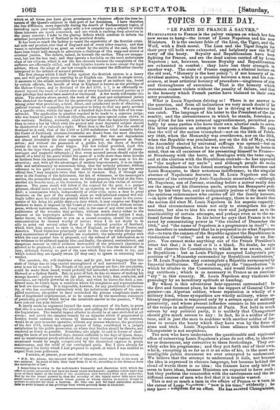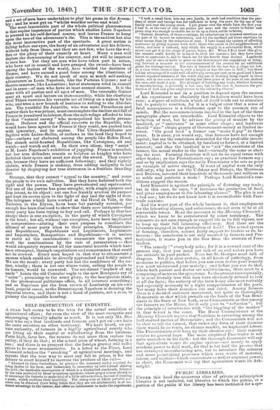TOPICS Or THE DAY.
" LE PARTI DE FRANCE it SAUVER."
HIIMILIATING to France is the paltry enigma on which her fate now seems to hang—the intent of Louis Napoleon and his new Ministers. It is the ancient fable of the Lion the Tiger, and the Wolf, with a fresh moral. The Lion and the Tiger fought for their prey till both were exhausted, and helplessly saw the Wolf carry off the booty. Royalty and Republicanism have been fighting for France, and see the dead nation carried off by Louis Napoleon ; not, however, because Royalty and Republicanism are exhausted in combat : they have lost their strength in another way. The state of France suggests a clinical lecture oa the old text, " Honesty is the best policy "; if not honesty of in- dividual motive, which is a question between a man and his con. science, at least artiatical honesty of procedure—singleness of aim and thoroughness of execution. That is the honesty which statesmen cannot violate without the penalty of failure, and that is the honesty which French parties have violated to their own utter prostration. Mica is Louis Napoleon driving at? There is no answer to the question, and from all indications we very much doubt if he himself knows. We suspect that he is driving at whatever he can catch. The language of his letter to the President of the As- sembly-, and the circumstances in which he stands, foretoken a coup d'etat for his own personal aggrandizement, permitted pro- bably by some parties who have their own ulterior ends to serve. His letter indicates an attempt to renew the Empire. He says that the will of the nation triumphed—not on the 24th of Febru. ary 1848, when the Monarchy was overthrown, nor on the 26th, when the Republic was proclaimed, nor on the 4th of May, when the Assembly elected by universal suffrage was opened—but on the 10th of December, when he was elected. It must be borne in mind, that on all occasions of his presenting himself to France— at Strasbourg with the boots, at Boulogne with the tame eagle, and at the election with the Republican cockade—he has appeared as "the nephew of my uncle"; and although people do make scandalous allusions to the forced marriage between Hortense and Louis Bonaparte, to their notorious indifference, to the singular absence of Napoleonic features in M. Louis Napoleon and the presence of the extremely Anti-Napoleonic moustache,—although M. Napoleon, son of Jerome, standing before a mirror really does see the image of his illustrious uncle, attests his Bonaparte pedi- gree by his very face, and is indignantly jealous of the man with the spurious countenance who carries off all the family honours, —in spite of these curiosities of genealogy, there is no doubt that the nation did elect M. Louis Napoleon in his sepotic capacity ; and that circumstance tends not only to strengthen his pre- tensions, but also to bias his own view and judgment as to the practicability of certain attempts, and perhaps even as to the na- tional favour for them. In his letter he says that France is to be saved by concentrating power in " the elected of December the 10th," and "the name of Napoleon is a programme in itself": we are therefore to understand that he is prepared to do what Napoleon did—to turn the cannon of the Republic against the Republicans in vindication of "order," and to accept a Consulship or an Em- pire. You cannot make anything out of the Prince President's letter but that ; it is that or it is a blank. No doubt, he says he will observe the Constitution to which he was sworn, and it is Republican : but as Louis Philippe accepted Lafayette's pro- position of " a Monarchy surrounded by Republican institutions,' so M. Louis Napoleon may contemplate a Republic surmounted by Imperial institutions. That would supply the "imperfection " to which he alludes in the Constitution, and would furnish a strik- ing antithesis ; which is as necessary in France as an election- " cry " in this country. M. Louis Napoleon may vindicate his genealogy by an hereditary aptitude at humbug. By whom is this adventurer heir-apparent surrounded? In the first and foremost place, he has the support of General Chan- garnier—an Algerian soldier, whose reputation is wholly of a military kind, whose sympathies are wholly military, whose ar- bitrary disposition is tempered only by a certain spice of military generosity, and whose present influence consists in his command of the troops in military occupation of Paris. Not held in much esteem by any political party, it is unlikely that Changarnier should give much esteem to any : in fact, he is a soldier of for- tune, and is just the man to combine with another soldier of for- tune to secure the booty which they have won by the force of arms and trick. Louis Napoleon's close alliance with General Changarnier is not auspicious. The men who have undertaken the questionable and equivocal office of subserving Louis Napoleon's plans do not offer, in charac- ter or demeanour, any corrective to these forebodings. They ser- vilely echo his programme; and they put forth one of their own, which, excepting in so far as it is an echo of his, is the most un- intelligible public document we ever attempted to understand. We believe that the attempt to understand it fails, not because the idea is expressed in obscure language, but because behind the cloud of words there is no idea : the framers have only tried to seem to have ideas, because Ministers are expected to have such ; but they perform the counterfeit with the carelessness and the in- different success of men who feel that it is trouble wasted. -- This is not so much a turn in the affairs of France se a turn in the career of LotN.ruieon : "now is his time." evidently ; he
t
may bay... &mg om for an effort. He has Rix:tired Changarnier,
and a set of men have undertaken to play his game in the Assem- bly ; and he must get on "whilst weather serves and wind."
The most lamentable part of the whole political phionomencei is that supine impotence of parties which enables Louis Napoleon to proceed in his self-devised course, and leaves France to hang upon the toss of the adventurer's die. This is thesaddest but also the most instructive part of the spectacle. A great nation is falling before our eyes, the booty of an adventurer and his fellows, without help from those, and they are not few, who have the wel- fare or the glory of their country at heart. Many a man will deplore the downcoming of his country, and yet will be impotent to save her. Yet they are men who have taken part in action, who have sat in council and have grasped the sword—have been among the leaders of the world, have wielded the destinies of France, and have earned a good fame among the illustrious of their country. We do not speak of men as much self-seeking adventurers as Louis Napoleon, like the Parisian Ulysses; nor of theatre-senators, like Lamartine ; but of statesmen tried in council and in arms—of men who have at least seemed sincere. It is the same with all parties and all ages of men. The venerable Guizot must sit apart and lecture on statesmanship, while his charlatan rival Thiers exercises his versatile art of living on a nation by his wits, and tries a new branch of business in ratting to the Absolut- ists. The youthful De Joinville, who was more Frenchman and warrior than be was prince, must contemplate the decline and fall of France in jaundiced indolence, from the safe refuge afforded to him by that "natural enemy " who monopolized his hostile precau- tions. Dufaure and the official converts to the Republic, who would have been agents for France if they could, are pushed back with ignominy, and lie supine. The Ultra-Republicans are fugitive with Ledru-Rollin, or outlaws in the land they hoped to rule—outlaws not sheltered among the people like Robin Hood. The stanch solid-hearted Republicans, like Cavaignac, sit and watch—and watch and sit. In their own idiom, they " assist " at M. Louis Napoleon's exhibition of juggling. France is assailed, but her true defenders remain as helpless as knights who have forfeited their spurs and must not draw the sword. They cannot stir, because they have no sufficient following; and they rightly abstain, while France is sinking, from adding indignity to her disaster by displaying her true statesmen in a fruitless brawling riot.
Strange, that they cannot " appeal to the country," and rouse the people to its own salvation. But they have forfeited both the right and the power. They have prevaricated and equivocated. Not one of the parties has gone straight, with single purpose and firm intent, to its object ; not one has frankly avowed its purpose and kept its course open to the light of day and the sight of man. The intrigues which have worked at the Hotel de Ville, in the Tuileries, in the Elysee, have been but partially revealed, yet enough has been diseloseelto show that there were intrigues—that every party has been trying to buy and sell. Perhaps to that last charge there is one exception, in the party of which Cavaignac is the head ; but all, without one exception, have been implicated in compromises abatingtheir awn purpose to conciliate the alliance of some party alien to their principles. Monarchists and Republicans, Republicans and Legitimists, Legitimists and Imperialists, Bonapartists and Republicans—it is useless to recite all the combinations : enumerate the parties, and work the combinations by the rule of permutation that would adequately represent all the unnatural accords which have been attempted, through negotiations and compromises that could not be avowed. Every man hoped in that way to circumvent a success which could not he directly approached and boldly seized. We see the result : every party has lost the confidence of the na- tion, wholly; there is not one whose voice, calling the people to its banner, would be answered. The soi-disant "nephew of my uncle" hoists the old Consular eagle to the new Bourgeois cry of " order "; promising to the army glory, to the bourgeoisie trade, to the professional politicians office, to all interests something; and as Napoleon put the Iron crown a Lombardy on his own head, proprid mane, so the Brummagem Napoleon is donning the Imperial crown, and there is not a band of patriots, not a man, to gainsay the impossible humbug.



























 Previous page
Previous page